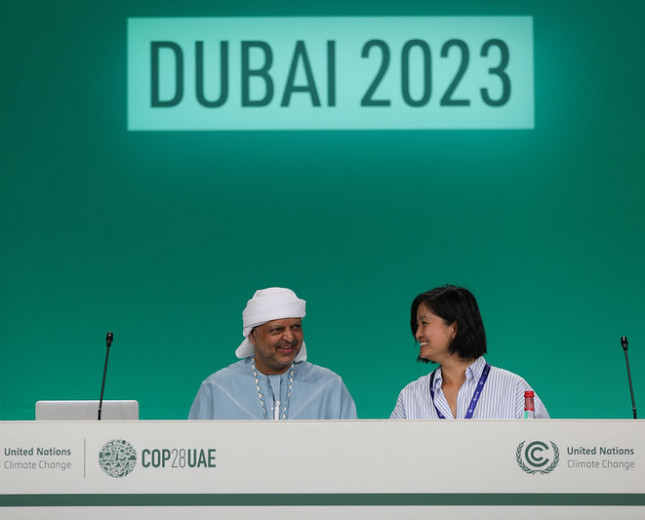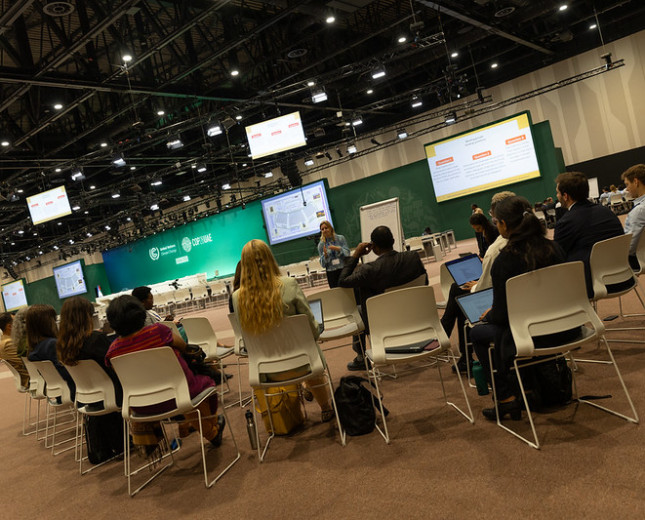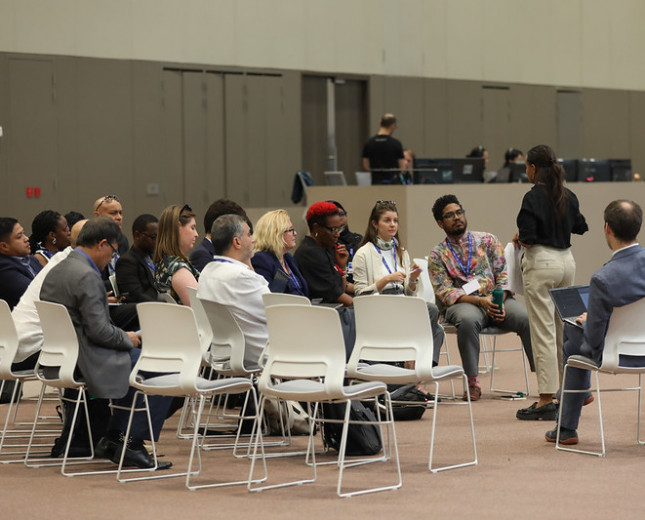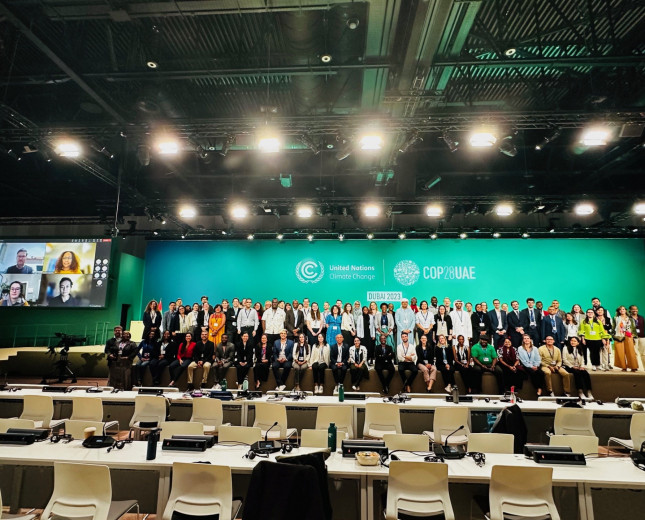Background
At COP 21, Parties decided that, in accordance with Article. 9, paragraph 3, of the Paris Agreement, the CMA will set a new collective quantified goal on climate finance (NCQG) from a floor of USD 100 billion per year, taking into account the needs and priorities of developing countries, prior to 2025. CMA 1 decided to initiate at its third session, in accordance with Article 9, paragraph 3 of the Paris Agreement, deliberations on setting the NCQG from a floor of USD 100 billion per year in the context of meaningful mitigation actions and transparency of implementation and taking into account the needs and priorities of developing countries, and agreed to consider in those deliberations the aim to strengthen the global response to the threat of climate change in the context of sustainable development and efforts to eradicate poverty, including by making finance flows consistent with a pathway towards low greenhouse gas emissions and climate-resilient development.
At CMA 3, Parties decided that the NCQG aims at contributing to accelerating the achievement of Article 2 of the Paris Agreement of holding the increase in the global average temperature to well below 2 °C above pre-industrial levels and pursuing efforts to limit the temperature increase to 1.5 °C above pre-industrial levels, recognizing that this would significantly reduce the risks and impacts of climate change; increasing the ability to adapt to the adverse impacts of climate change and foster climate resilience and low greenhouse gas emission development in a manner that does not threaten food production; and making finance flows consistent with a pathway towards low greenhouse gas emission and climate-resilient development.
In March 2023, the co-chairs of the ad hoc work programme on the NCQG developed a workplan that outlined the preliminary themes for discussions at each technical expert dialogue in 2023, in order to develop options across all elements of the goal ahead of CMA 5 for consideration by Parties, including, inter alia, quantity, quality, scope and access features, as well as sources of funding, of the goal and transparency arrangements to track progress towards achievement of the goal, without prejudice to other elements that will also be considered as the deliberations evolve, including matters relating to time frame. Accordingly, the eighth technical expert dialogue (TED) will focus on the theme “stocktake”
Following the previous decisions taken by the CMA on the aim of the NCQG and its elements, and building on previous TEDs (See TED 1, TED2, TED 3, TED 4, TED 5, TED 6 and TED 7), as well as submissions by and consultations with Parties, TED 8 will focus on a comprehensive reflection, looking into the technical expert dialogues conducted in 2023. Moreover, the dialogue will also focus on an anticipatory outlook, for the upcoming year, 2024 leveraging the reflections, to inform the work of technical expert dialogues in 2024.
Objective
The objective of TED 8 is therefore to:
- Reflect on the work done in 2023, including progress made to date and any issues that may require further attention;
- Focus on forward-looking discussions to drive progress toward setting the NCQG in 2024.
Format and participation
TED 8 will be open to all registered participants of the twenty-eighth session of the Conference of the Parties (COP) for onsite participation or remotely via the conference platform. Please refer to the registration details through the links provided on this web page. To ensure inclusive and broader participation, participants not registered for COP 28 may participate virtually. As mandated, the dialogue will also have webcast.
Similar to previous TEDs, TED8 will be organized to facilitate technical discussions on the NCQG, comprising primarily of breakout group session engaging participants to share experiences from previous TEDs, including identifying challenges and opportunities and lessons. Scene-setting presentation and panel discussion will provide an overview of the discussion topics prior to breakout group session. Following the breakout group sessions, sufficient time will be dedicated to report back, and for open discussion among all participants to exchange views. In addition, the technical expert dialogues also present an opportunity for dynamic and interactive exchanges of a wide range of perspectives and experiences on the potential design and implementation of the NCQG.
|
28 November 2023
14:00–20:00 (GMT+4)
Plenary 2, Expo City Dubai, United Arab Emirates
|
| Time (GMT+4) |
Session titles/description |
Speakers and Facilitators |
|
14:00 – 14:25
|
Opening and introductory remarks (25 min) |
Welcoming remarks
- UNFCCC secretariat
- Ambassador Mohamed Nasr,bio COP27 Presidency lead negotiator
Introduction by the co-chairs
- Overview of the organization of the eighth technical expert dialogue
Fiona Gilbert and Zaheer Fakir, co-chairs of the ad hoc work programme on the NCQGbio
|
| 14:25 – 14:45 |
Reflections on the work undertaken in 2023 (20 min)
Reflections on the progress of the work done up to TED7
|
Scene-setting presentation
- Fiona Gilbert and Zaheer Fakir, co-chairs of the ad hoc work programme on the NCQG
|
| 14:45 – 15:25 |
Panel discussion on work undertaken in 2023 and outlook for 2024
(40 mins)
- What milestones or achievements were made towards the progress of the NCQG in 2023, as outlined in the co-chairs’ work plan?
- How can the achievements and lessons from the technical expert dialogues in 2023 be applied to accelerate progress and achieve the desired outcome on the NCQG in 2024?
- Are there any issues that require further attention or that have not been covered comprehensively?
|
- Gabriela Blatter,bio Switzerland
- Kelly Sharp,bio Canada
- Matheus Bastos,bio Brazil
- Ambassador Janine Felson,bio Belize
- Thomas Tayler,bio Aviva Investors
- Meenakshi Raman,bio Third World Network
Moderators: Fiona Gilbert and Zaheer Fakir, co-chairs of the ad hoc work programme on the NCQG
|
| 15:25 – 16:55 |
Working groups (90 mins)
The co-chairs will briefly outline the approach and modalities for the working group sessions and divide in-person participants into five working groups and the virtual participants separately.
- What milestones or achievements were made towards the progress of the NCQG in 2023, as outlined in the co-chairs’ work plan?
- What were the challenges encountered and lessons learned from the technical expert dialogues conducted in 2023, and how can these experiences inform and improve future dialogues?
- Are there any issues that require further attention or that have not been covered comprehensively?
|
| 16:55 – 17:25 |
Coffee break |
|
| 17:25 – 18:35 |
Ice-breaking activity (10 minutes)
Report back of breakout group discussions (70 minutes)
|
Moderators: Fiona Gilbert and Zaheer Fakir, co-chairs of the ad hoc work programme on the NCQG
|
| 18:35 – 19:45 |
Outlook for 2024 (70 minutes)
Guiding questions:
- How can the achievements and lessons from the technical expert dialogues in 2023 be applied to accelerate progress and achieve the desired outcome on the NCQG in 2024?
- What political level guidance is necessary on NCQG elements at CMA5 to arrive at a successful outcome at CMA6?
- What working modalities would be most pertinent at the technical and political levels in 2024?
|
Open plenary discussions
Moderators: Fiona Gilbert and Zaheer Fakir, co-chairs of the ad hoc work programme on the NCQG
|
| 19:45 – 20:00 |
Closing remarks and Wrap-up of the day (10–15 min) |
Closing remarks
- Maitha Alkaabi,bio Incoming COP28 Presidency
Wrap up of the day
- Fiona Gilbert and Zaheer Fakir, co-chairs of the ad hoc work programme on the NCQG
|



